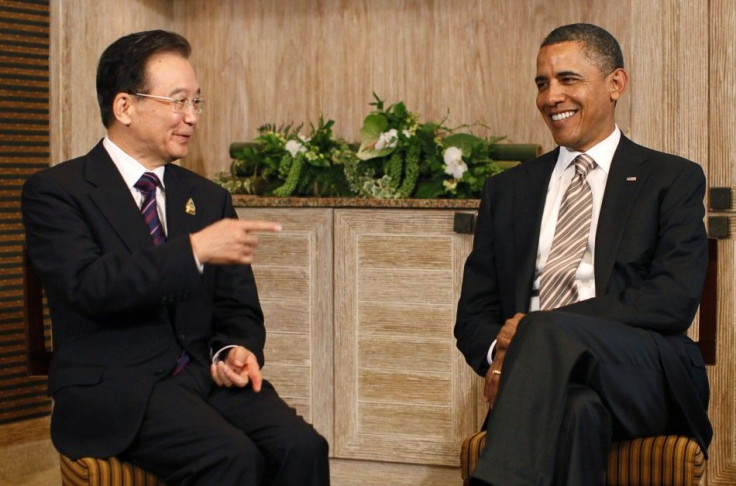US, China Hold ‘Constructive’ Talks on Trade, Currency, South China Sea

Chinese and U.S. leaders have been holding constructive talks about the controversial subject of who controls the South China Sea, according to American officials at the East Asia Summit in Bali, Indonesia.
United States President Barack Obama, in the final engagement of his nine-day Asia-Australia trip, met with Chinese Premier Wen Jiabao on the sidelines of the summit at the Nusa Dua resort.
United States National Security Adviser Tom Donilon told reporters that Obama and Wen met informally and primarily discussed economic issues, including currency controls.
Regarding the disputed sovereignty on the South China Sea, Donilon indicated: We [the U.S.] don't have a claim, we don't take sides in the claims, but we do as a global maritime power have an interest in seeing these principles applied broadly.
The South China Sea is claimed by a number of regional countries, including Vietnam, the Philippines, Taiwan, Malaysia, Brunei, and China. The body of water is not only a key shipping route, but it also reportedly may hold huge reserves of oil and gas.
China claims the sea belongs entirely to Beijing, while the other nations said they have a partial stake in the territory.
Meanwhile, the US is seeking to boost its influence in Southeast Asia, putting it at direct loggerheads with an ascendant China.
Indeed, on Friday, Wen issued a clear warning to the U.S. not involve itself in the maritime dispute.
External forces should not use any excuse to interfere, Wen said in a speech.
The dispute on the South China Sea is a matter that has been going on for years. It should be resolved by the relevant sovereign states through friendly consultation and discussion directly.
The Philippines government had reportedly asked Washington to assist in resolving the disagreement, but Surin Pitsuwan, the secretary-general of The Association of Southeast Asian Nations (ASEAN) insisted that China and his organization could find a peaceful solution without outside involvement.
In a broader context, Obama has promised that the U.S. will increase its presence in Southeast Asia, already ordering the deployment of troops to Australia.
Donilon said the U.S. has been quite direct with the Chinese about our strategy, explicitly asserting Washington’s wish to maintain stability and peace in the region.
Not surprisingly Chinese media expressed its disdain and disapproval toward America’s ambitions in Asia.
If the United States sticks to its ‘Cold War’ mentality and continues to engage with Asian nations in a self-assertive way, it is doomed to incur repulsion in the region, a Chinese news agency warned.
With regard to sending U.S. troops to Australia, Chinese media outlets were vociferous.
The state-owned People’s Daily warned Australia: Australia surely cannot play China for a fool. It is impossible for China to remain detached, no matter what Australia does to undermine its security. If Australia uses its military bases to help the U.S. harm Chinese interests, then Australia itself will be caught in the crossfire. [Australian Prime Minister Julia] Gillard may be ignoring something -- their economic co-operation with China does not pose any threat to the U.S., whereas the Australia-U.S. military alliance serves to counter China.
© Copyright IBTimes 2024. All rights reserved.




















